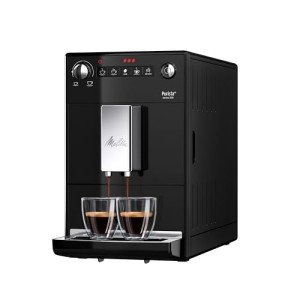The World of High-Quality Espresso Machines: A Comprehensive Guide
Espresso has actually ended up being a precious beverage amongst coffee lovers worldwide, known for its rich taste, intense aroma, and adaptability. The heart of a fantastic espresso depends on the machine utilized to brew it. High-quality espresso machines are designed to deliver the ideal shot, making them a vital investment for coffee fans. This post explores various kinds of high-quality espresso machines, their functions, maintenance tips, and responses to regularly asked concerns.
Kinds Of High-Quality Espresso Machines
High-quality espresso machines fall under a number of categories, catering to various choices, ability levels, and budgets. The primary types consist of:
| Type of Machine | Description | Suitable User |
|---|---|---|
| Manual Espresso Machines | Requires user ability to manage extraction and pressure. Offers the most control over the developing process. | Experienced baristas and lovers |
| Semi-Automatic Machines | Integrates manual operation with automation. Users control the grind and tamping, while the machine manages water dispersion. | Intermediate users |
| Automatic Espresso Machines | Automate the brewing procedure, permitting programmable developing times and temperatures. | Casual coffee drinkers |
| Super-Automatic Machines | Have integrated grinders and are totally automated, managing whatever from grinding to brewing and steaming. | Users looking for convenience |
| Commercial Espresso Machines | Created for high volume use in cafes and restaurants, offering sturdiness and speed. | Entrepreneur |
In-depth Overview of Each Type
Manual Espresso Machines
- Pros: Complete control over the brewing process; can produce exceptional quality espresso.
- Cons: Requires considerable ability; time-consuming.
Semi-Automatic Machines
- Pros: Balanced control, blending manual and automatic procedures; superior quality espresso is still possible.
- Cons: Requires some knowledge and experience to master.
Automatic Espresso Machines
- Pros: User-friendly; reduces the discovering curve while still producing high-quality espresso.
- Cons: Still requires some understanding of coffee-making fundamentals.
Super-Automatic Machines
- Pros: Maximal convenience; little skill needed; suitable for individuals or households who want coffee without difficulty.
- Cons: Higher price point; might lack the fine-tuning capabilities of manual machines.
Commercial Espresso Machines
- Pros: Built for longevity and efficiency; typically includes features for high-volume turns.
- Cons: Expensive; may be overkill for home use.
Secret Features to Consider
When searching for a high-quality espresso machine, several crucial functions must be taken into consideration:
- Pressure and Pump Type: Look for machines with a minimum of 9 bars of pressure, which is necessary for drawing out the best taste from coffee beans.
- Boiler Type: Single, double, and heat exchanger boilers each affect how the machine carries out and the speed of brewing.
- Construct Quality: High-quality materials such as stainless-steel are preferable for durability and visual appeals.
- Reduce of Use and Cleaning: Some machines require substantial cleaning, while others are designed for simple upkeep.
- Temperature level Control: Consistent temperature level is crucial; think about machines with PID controllers for accurate control.
Benefits of High-Quality Espresso Machines
Investing in a high-quality espresso machine uses a wide range of benefits:
- Superior Quality: High-end machines permit greater control, leading to tastier espresso.
- Sturdiness: Built to last, quality machines require less repair work and replacements.
- Modification: Users can enjoy a customized experience by adjusting grind size, shot timing, and other settings.
- Increased Convenience: Automatic and super-automatic alternatives permit enthusiasts to enjoy espresso with minimal effort.
Upkeep and Care for High-Quality Espresso Machines
To keep an espresso machine functioning efficiently, regular upkeep is crucial. Here are suggestions for preserving a high-quality espresso machine:
Descale Regularly:
- Use a descaling service every few months to prevent buildup of minerals from water, which can impact flavor and performance.
Clean the Brew Group:
- For machines with a detachable brew group, tidy it routinely to guarantee a tidy extraction.
Change Water Filters:
- Use a water filter and change it as needed to minimize impurities in your brewing water.
Daily Cleanings:
- Rinse the portafilter and group head after each use to prevent oil buildup.
Watch on the Parts:
- Monitor seals, gaskets, and other parts for wear and tear and replace them as required.
Often Asked Questions (FAQs)
1. What is the best espresso machine for beginners?
For newbies, a semi-automatic machine frequently provides an excellent balance of usability and control, enabling users to learn the abilities necessary for making terrific espresso.
2. Are super-automatic machines worth the financial investment?
Yes, for those who focus on benefit and ease over control, super-automatic machines can be a worthwhile investment, specifically for households or hectic specialists.
3. Just how much should I anticipate to invest in a high-quality espresso machine?
High-quality espresso machines range substantially in rate, with manual machines beginning at a couple of hundred dollars, while super-automatic or commercial machines can surpass several thousand.
4. Can I make other coffee drinks with an espresso machine?
Yes, many espresso machines have steam wands or accessories that allow users to produce lattes, cappuccinos, and more.
5. Dual Boiler Espresso Machines of time do espresso machines typically last?
With appropriate upkeep, high-quality espresso machines can last over a decade, making them a long-lasting investment in your coffee satisfaction.
High-quality espresso machines yield a transformative coffee experience, whether delighted in at home or in a commercial setting. By understanding the types offered, their functions, and the maintenance needed to keep them running efficiently, consumers can make informed decisions that elevate their coffee-drinking experience.

